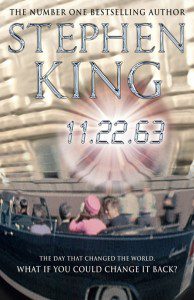 Publisher: Hodder and Stoughton
Publisher: Hodder and Stoughton
Paperback (740pp)
The plot of 11:22:63, the latest hernia-inducing tome from master storyteller Stephen King, is like a wire coat hanger – simple but effective. Upon this hangs a story that is like a magnificent velvet coat of many colours. As in the best of King’s novels the story can be summed up as a simple ‘What if?’ scenario; what if you could travel back in time and stop the assassination of JFK? As with those other novels it’s the journey to the answer that entertains and delights rather than the actual answer.
The hero of the piece is Jake Epping, a divorced high-school English teacher, who is shown a portal into 1958 by Al, the owner of a local diner that he frequents. The portal is situated in a storeroom but emerges into a conveniently cordoned off area that never loses its ‘No Entry’ sign years later; a subtle hint that there are others besides Al and Jake who know of the time portal. Al’s reason for revealing the existence of his way into 1958 is simple – he‘s dying and wants Jake to see through a plan he himself has spent close to four years trying to accomplish. To Jake Al appears to have aged overnight as, no matter how long is spent in the past, only two minutes passes in their modern day timeline.
Jake finds it easy to accept the basic fact of time-travel, seeing and experiencing a day in 1958 that features a wonderfully described glass of root beer. However Jake finds Al’s insistence that the past, although quite stubborn and resistant, can be changed a little harder to believe. To confirm this to himself he first tries to change the future for a little boy who will grow up to be the injured and learning-disabled janitor, Harry Dunning, at the high school he teaches at. This secondary plotline is where a lesser writer would lose the book and particularly the reader’s empathy and respect for the character of Jake. Stephen King, though, has always been a masterful painter of characters, in particular their inner thoughts and decisions, which so many movie adaptations fail to compensate for in transferring them from page to screen. The reader is left in no doubt that Jake, or George as he goes by in the ‘land of ago’, has come to the hard but correct conclusion as to what must be done to change the course of Harry Dunning’s life.
The narrative hums along through this first quarter, set largely in Lisbon Falls and Derry, with a wonderful reward to King’s ‘Constant Reader’ thrown in. However, once Jake reaches the small town of Jodie, this is when it really starts to sing, propelling the reader into the lives of its residents and through several hundred pages of some of King’s best writing in a decade. His recent output in books such as Duma Key, Lisey’s Story and the novella collection Full Dark, No Stars have certainly been far from poor but here there is a real feeling that you’re reading a book that will sit up there with The Shining, The Stand and It in the years to come as a writer at the very top of his game. When the reader is so enveloped in the characters and story, as they are here, there are very few authors who can come close to King in any genre.
When the time comes we are as reluctant as Jake to leave for Dallas, but leave we must for he has a date with Mr Oswald at a certain book depository. In some ways this is the weakest section of the book with the historical figures, in particular Oswald and his wife, appearing one-dimensional when contrasted with the residents of Jodie. However the plot remains strong and the pace even increases as Jake races towards his necessary collision with history. The many attempts of the past to prevent Jake reaching the book depository are particularly gripping and a cameo from a wonderfully depicted large African-American lady on a bus further highlights the lack of dimension to the real people. The confrontation between Jake and Oswald is expertly handled as King puts the reader right on the sixth floor of the Texas Book Depository and in the thick of the action.
If this book were solely about the chance for Jake to change events on that day in November 1963 then it could well have ended right there amongst storage boxes and workmen’s tools, leaving the effect of the intervention ambiguous. But this is Jake’s story and he has strong incentives to ascertain if he has made the right choice. King is often criticised for his endings, particularly in reviews of his previous book Under the Dome, but here he strikes a perfect balance between drama and wish fulfilment that would leave even his harshest critics in agreement that the ending more than rewards the time invested in what is one of the master’s strongest books of his career.
ROSS WARREN
If you enjoyed our review and want to read 11:22:63 by Stephen King, please consider clicking through to our Amazon Affiliate links. If you do you’ll help keep the This Is Horror ship afloat with some very welcome remuneration.
Buy 11:22:63 by Stephen King (UK)
Buy 11:22:63 by Stephen King (US)










2 comments
Thanks, Ross. Great review.
Will check it out as soon as I’m done with Under The Dome.
Great review Ross – I agree with every word. I couldn’t put this down, it’s a great book and one of his best for years. The ending is perfect, and incredibly moving.